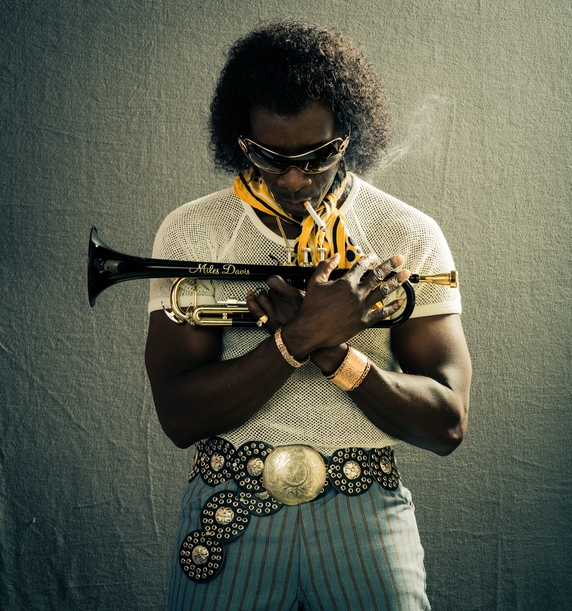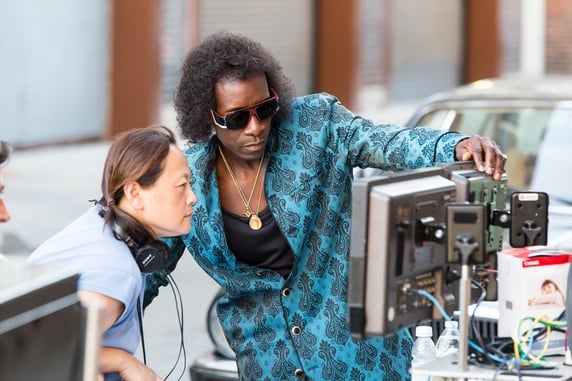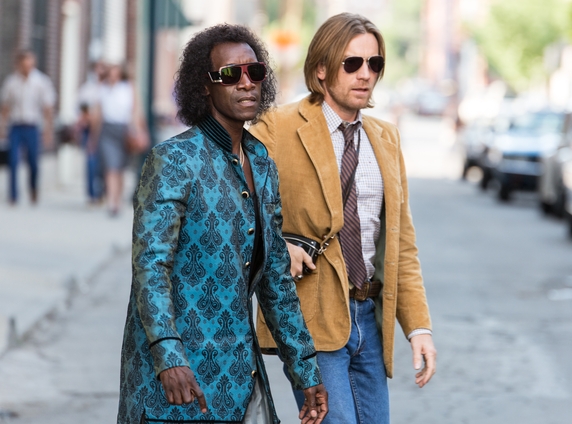Don Cheadle stars in and directs this anti-biopic of jazz pioneer and badass Miles Davis. It's one wired trip and the music is great but Miles Ahead misses out on the mystique of the man
"Don't call my music jazz. It’s social music. I am modal," grumbles Miles Davis in the opening scene of this helter skelter film about the jazz pioneer. It's a line that could very well apply to Miles Ahead; Don’t call Don Cheadle's film a biopic. It’s far more modal than that.
Cheadle, who stars and directs, struggled to get the story onto the screen and thankfully he takes a fragmented and impressionistic approach to his wily subject. If his aim was to somehow capture the lighting in a bottle quality of the music, he has largely succeeded. Miles Ahead is a free-wheeling and ramshackle affair that manages, between car chases, shoot outs, and industrial drug use, to nail Miles Davis, the mercurial genius and the arrogant badass.
We first encounter him living in grand seclusion, rolling around his tumbledown brownstone in New York. It is 1979 and Davis is in agony from a degenerative hip disorder. He hasn't released any new music in five years. It is a self-imposed exile/twilight, a creative flunk where Miles keeps his trumpet hidden away for fear it will trigger a lapse into another tormented reverie about previous triumphs and, indeed, previous happiness. Or whatever passed for happiness for Miles Davis.

He has lost his considerable nerve so when an overly keen Rolling Stone journalist by the name of Dave Brill (a suitably bedraggled but not terribly good Ewan McGregor) doorsteps the reclusive jazz legend for a comeback interview, he is shown not only the door but the working end of a revolver.
Meanwhile, Columbia Records are trying to get their wayward genius to yield up the new music he has been working on. This reel of new material has taken on a near mythical status and its release will herald the greatest rebirth (of cool) in jazz history. In fact, Columbia, lead by odious record executive Harper Hamilton (a grinning and obnoxious Michael Stuhlbarg), will go to any means fair or foul to collect on their investment. However, this Holy Grail will eventually become something of a wry punchline for the whole movie.
Thing is, Dave Brill and the tape of new material are works of fiction. As are the wild scrapes and chases around the streets of New York that make up a large part of Miles Ahead. Cheadle cleverly zones in on an imagined 24 hours in Davis' crazed late-seventies existence and the surreal and edgy action gives Miles Ahead an enjoyable madcap quality.

Cheadle on the set of Miles Ahead
Brill's snatched interchanges with his reluctant interviewee become a framing device and we lurch back into scenes from Miles’ glory days when he was the coolest cat on the block, the be-suited young prince of the scene. The fifties and sixties scenes take on a languorous, impressionistic quality, especially when he is with his first wife, dancer Frances Taylor (an excellent Emayatzy Corineadli).
Cheadle presents a complicated life in fractured flashback scenes and this is an impressive directorial debut. Cigarette smoke wreathes Miles’ scowl in nearly every scene and the cameras are jumpy and jerky, reflecting the music itself and the chaos of Miles’s life.

Ewan McGregor becomes Miles' confidant and enabler
Cheadle certainly has Davis’ late seventies look of frazzled irascibility and he speaks in a nicotine wheeze. Cheadle doesn't hold back on the music either; the scenes of Miles piecing together landmark works are exhilarating and stick around for the very cool closing credits, which feature a crack band made up of Wayne Shorter, Herbie Hancock, Robert Glasper and Esperanza Spalding.
Miles Ahead is impressionistic, mercurial and wild. The only quibble is that it perhaps misses out on the mystery of the man.
Alan Corr













